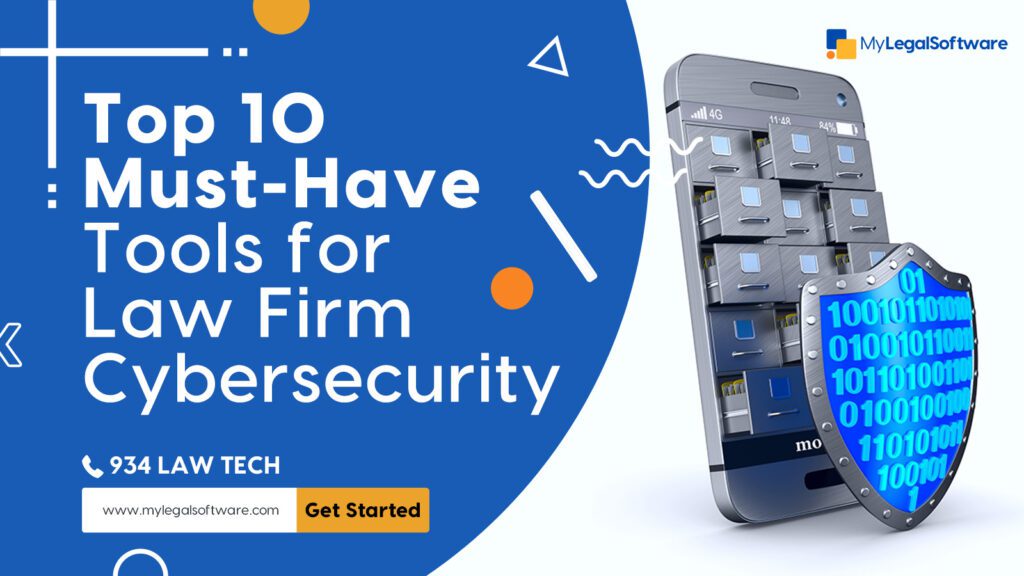As your legal practice navigates the complexities of the digital age, law firm cybersecurity emerges as a fundamental cornerstone to safeguard the sensitive information entrusted to you by your clients.
Cyber threats are not an “if,” but a “when,” making it imperative for you to employ legal data breach notification software and robust protective measures like phishing training for lawyers online.
The cost of a HIPAA compliance audit for law firms is an investment into the privacy of healthcare-related cases, while a GDPR compliance checklist for law firms helps you navigate the intricate regulations protecting personal data within the EU.
Is your firm’s cloud as secure as it can be? Adhering to legal cloud security best practices is vital for client confidence and data integrity.
Of course, preparation goes beyond prevention; therefore, drafting a comprehensive cybersecurity incident response plan for law firms template is crucial.
And should the worst occur, a cybersecurity insurance quote tailored for law firms becomes your safety net, offering peace of mind amidst the turbulence of cyber threats.
Key Takeaways
- Elevate your firm’s defense framework with top-notch cybersecurity tools and practices.
- Invest in legal data breach software to promptly respond to any potential data compromises.
- Gain foresight and preparedness through phishing training tailored for legal professionals.
- Ensure compliance and mitigate risks with GDPR and HIPAA audits specific to law firms.
- Implement legal cloud security best practices for a fortified data storage environment.
- Develop an incident response plan specifically designed for the legal sector’s needs.
- Consider cybersecurity insurance as a critical facet of your comprehensive security strategy.
The Rising Need for Cybersecurity in Law Firms
As a legal professional, you understand the value of confidentiality and the protection of sensitive information.
With increasing cyber threats, particularly ransomware attacks, law firms must prioritize constructing a comprehensive ransomware recovery plan, a critical element of a law firm ransomware recovery plan template.
The stakes are incredibly high in legal scenarios, where client trust hinges on the utmost security and privacy of their data.
Let’s consider the vulnerabilities that you may encounter in day-to-day operations. Ransomware, one of the most disruptive forms of cyberattacks, poses a real threat to law firms globally.
A single breach can compromise a multitude of sensitive documents, resulting in catastrophic reputational and financial damages.
Therefore, integrating legal cloud security best practices into your firm’s protocols is not just important – it’s essential.
Ransomware doesn’t discriminate; from solo practitioners to large firms, any entity is fair game for cybercriminals.
It’s also important to note that ransomware can permeate through various channels, including phishing emails, compromised software updates, or even through an employee’s personal device connected to the firm’s network.
That’s why crafting a layered security approach, embracing preventative measures like staff training, and adopting a robust legal cloud security framework, should be a top priority.
Here are some steps to strengthen your response to such threats:
- Regularly back up all sensitive data.
- Keep all software and systems up to date.
- Implement strict access controls and user permissions.
- Ensure continuous monitoring and intrusion detection systems.
The key to effective ransomware defense is preparedness. Using a template can ensure that nothing is overlooked in the heat of the moment.
However, recovery plans are not ‘one-size-fits-all’, hence customizing your law firm ransomware recovery plan template to match the unique needs of your practice is crucial.
It can shape the quick restoration of services and client trust after an attack.
10 Must-Have Tools for Law Firm Cybersecurity
Tools | Uses |
1. Legal Data Breach Notification Software | Helps you quickly inform clients and authorities in case of a data breach, complying with regulations and minimizing damage. |
2. Phishing Training for Lawyers | Educates staff to recognize and avoid phishing scams, a common entry point for cyberattacks. |
3. HIPAA Compliance Audit | Ensures your firm adheres to healthcare data privacy regulations, avoiding hefty fines and reputational damage. |
4. GDPR Compliance Checklist | Guides your firm in following European data protection regulations, protecting client information within the EU. |
5. Legal Cloud Security Best Practices | Provides a framework for securely storing and accessing data in the cloud, crucial for modern law firms. |
6. Cybersecurity Incident Response Plan | Outlines steps to take in case of a cyberattack, minimizing downtime and data loss. |
7. Cybersecurity Insurance for Law Firms | Provides financial protection against data breaches and other cyber threats, offering peace of mind. |
8. Secure Client Portal Software | Creates a secure digital space for client communication and document sharing, upholding confidentiality. |
9. Multi-Factor Authentication (MFA) Legal Software Integration | Adds an extra layer of security to logins, making unauthorized access much harder. |
10. Encryption | Protects data at rest and in transit with strong encryption algorithms, keeping sensitive information safe even if accessed by unauthorized parties. |
Best Secure Legal Case Management Software
As law firms navigate through an array of legal case management solutions, it is crucial to identify software that commits to top-tier security without sacrificing functionality. Focus on the industry leader, myLegalSoftware, a paradigm of the best secure legal case management software, designed specifically with law firms’ safety and efficacy in mind. Let’s examine what sets apart a high-caliber legal case management tool from its counterparts.
Features of Top-Tier Case Management Platforms
When choosing a legal case management software, prioritizing platforms with comprehensive features is key. Functionality such as real-time case tracking, meticulous document management, and robust client communication capabilities are essential. The secure client portal comparison for law firms reveals that myLegalSoftware extends a vault-like space for client interactions, enhancing both security and service levels.
Integrating Legal Case Management Software with Strong Access Controls
Integration of stringent access controls within your legal management software ensures only authorized personnel handle sensitive information. myLegalSoftware’s multi-factor authentication legal software integration sets an industry standard, providing a much-needed shield against intrusions. The software’s features include role-based access and protocols that exemplify legal case management software with strong access controls.
Choosing Software with Secure Document Sharing for Law Firms
Selecting the right software extends beyond basic functionalities; it’s about securing your digital interactions. With this in mind, software that prioritizes secure document sharing for law firms is non-negotiable. myLegalSoftware responds to this need with exemplary features that maintain the integrity and confidentiality of your legal documentation.
Advanced Tools and Practices for Client Data Protection
When considering the protection of sensitive information within your law firm, the integration of advanced tools and practices is paramount. The use of multi-factor authentication legal software integration is just the starting point for defending against potential cyber-attacks and breaches. Furthermore, the deployment of encrypted secure client portals for law firms and assessing your Law firm cybersecurity vulnerabilities are all critical steps towards solidifying your defense.
Implementing Multi-factor Authentication Legal Software Integration
Protecting client data begins with the robust security measure of multi-factor authentication (MFA). By requiring multiple forms of verification, MFA is a frontline defense against unauthorized access, adding a necessary hurdle for potential intruders. Its integration into your legal software enhances your security profile significantly, ensuring that only authorized personnel have access to sensitive case details and client documents.
Utilizing Secure Client Portals for Law Firms: Comparison and Demo Request
To uphold the stringent privacy standards essential for law firms, secure client portals are a must-have. These portals not only offer an encrypted avenue for client communication but also streamline document sharing and case management processes. Below, find a comparison of hypothetical solutions on the market and understand why it’s critical to request a secure client portal software demo before embracing a particular platform.
| Feature | Portal A | Portal B | Portal C |
|---|---|---|---|
| Encryption Level | 256-bit SSL | 128-bit SSL | 256-bit SSL |
| Multi-factor Authentication | Available | Limited | Available |
| Document Management | Robust | Basic | Advanced |
| Customizability | High | Medium | Low |
| Demo Availability | Yes | No | Yes |
Encryption and the Best Password Manager for Law Firm Confidentiality
The importance of encryption in securing your law firm’s data cannot be overstated. It serves as an impervious layer that shields information from unauthorized interception. Coupled with the usage of the best password managers, which facilitate complex and hard-to-crack passwords, you ensure that your digital assets remain under lock and key, accessible only to those who truly need them.
Law Firm Cybersecurity Vulnerability Assessment
Conducting a timely law firm cybersecurity vulnerability assessment is your proactive approach to preventing data incidents. By scrutinizing your current security protocols and identifying gaps, you can outline a targeted plan of action to ward off cyber threats. This assessment is an ongoing process vital to adapting to the ever-evolving nature of digital risks faced by law firms today.
Conclusion
In the quest to fortify legal practice against modern cyber threats, the integration of legal case management software with strong access controls stands as a critical bulwark. As we’ve explored in the preceding sections, the bedrock of a robust law firm cybersecurity strategy rests on adopting sophisticated tools designed to safeguard sensitive client data. These solutions not only ensure compliance and uphold the confidentiality that clients expect but also infuse daily operations with a sense of impregnable security.
Reflecting on the spectrum of practices and platforms discussed, from advanced encryption methodologies to multi-factor authentication legal software integration, it’s evident that technology continues to play a leading role in the defense against cyber incursions. Yet, amid this ever-evolving arsenal of cyber defenses, acquiring a cybersecurity insurance for law firms quote should be viewed as the keystone to a comprehensive protection strategy—combining the prudence of risk management with the efficiency of technological safeguards.
To you, the guardians of legalese and champions of justice, vigilance is your eternal watchword—in the courts and within the digital dominions of your practice. Remain unwavering in your commitment to continual Law firm cybersecurity improvement as you traverse the dynamic landscape of data protection. Your resolve will not only cement the trust of your clients but will also ensure the integrity of the very justice system itself.
FAQ
What key tools should law firms use for cybersecurity?
Law firms should consider using legal data breach notification software, ensure their staff undergo phishing training, have a routine HIPAA compliance audit, follow a GDPR compliance checklist, and regularly review and update their cybersecurity incident response plan. It’s also wise to explore Law firm cybersecurity insurance options for added protection.
Why is cybersecurity particularly important for law firms?
Law firms deal with highly sensitive client information, making them a target for cybercriminals. In addition to the reputational damage a breach could cause, there are also legal ramifications for failing to protect client data. Implementing effective cybersecurity measures is therefore crucial.
What features should be looked for in legal case management software?
When choosing legal case management software, look for strong access controls, multi-factor authentication, a secure client portal, and options for secure document sharing. Ensure the software meets your firm’s specific needs through a free trial or demo before making a commitment.
How can law firms ensure their client portals are secure?
Law firms should compare secure client portals that offer end-to-end encryption, have robust authentication processes, and comply with legal standards such as HIPAA for healthcare or GDPR for European data. Requesting a demo can provide insight into the portal’s user experience and security features.
What is the benefit of using a password manager for law firms?
A password manager helps law firms maintain strong, unique passwords for all their accounts, reducing the risk of password-related breaches. It ensures secure password storage and sharing, which is essential for maintaining client confidentiality and firm security.
How often should law firms conduct a cybersecurity vulnerability assessment?
It’s recommended for law firms to conduct vulnerability assessments at least annually, or more frequently if significant changes occur in their IT environment or new threats emerge. Regular assessments help identify and address security gaps proactively.
What are legal cloud security best practices?
Best practices for legal cloud security include using secure connections (like VPNs), employing encryption for data at rest and in-transit, implementing strong access controls, regularly updating software, and training employees to recognize and report potential threats.
How should a law firm respond to a ransomware attack?
A law firm should immediately follow its ransomware recovery plan, which should outline steps to isolate infected systems, secure backup data, and notify relevant parties. Engage cybersecurity professionals to assist with recovery efforts and law enforcement if necessary.
What costs are associated with a HIPAA compliance audit for law firms?
The cost of a HIPAA compliance audit varies based on the size of the firm, the complexity of the data systems, and the depth of the audit required. Firms should get quotes from several auditors to find a service that fits their needs and budget.
Should a law firm integrate multi-factor authentication (MFA) into their systems?
Yes, integrating MFA adds a critical layer of security, protecting against unauthorized access by requiring multiple forms of verification before allowing entry into sensitive systems and data.
How can phishing training for lawyers benefit a law firm?
Phishing training for lawyers educates them on recognizing fraudulent communications designed to extract sensitive information. Such training can significantly reduce the risk of falling victim to scams that could compromise the firm’s and clients’ data.








